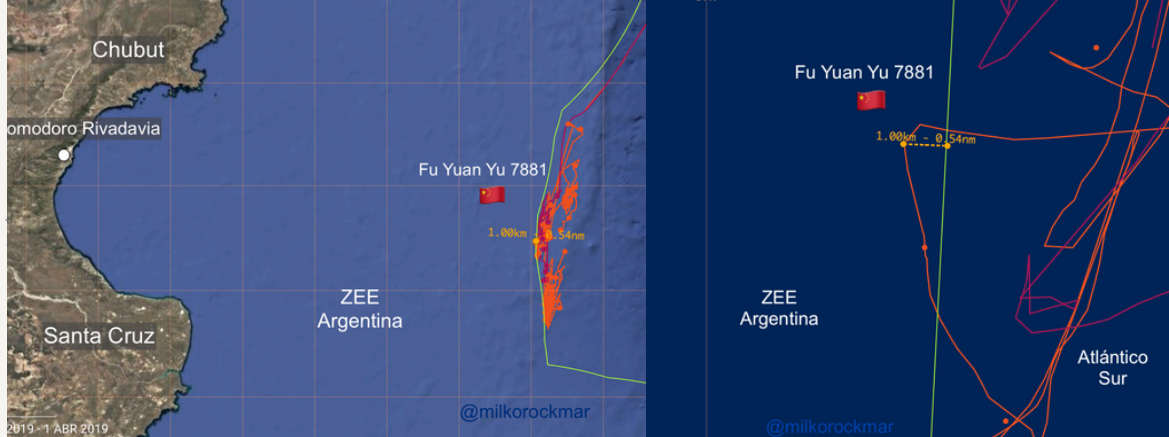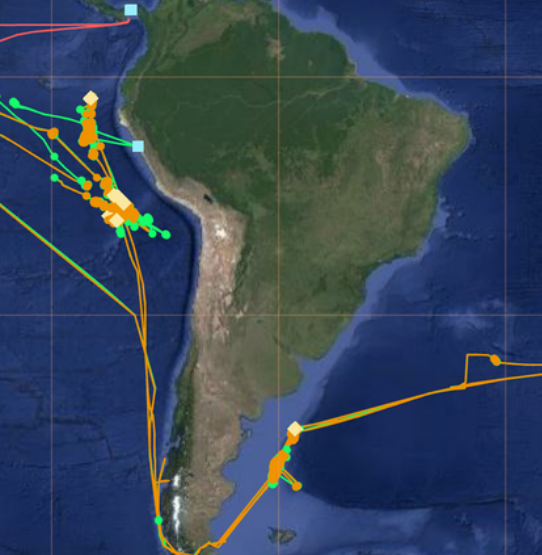El Circulo de Políticas Ambientales de la Argentina, efectuó en el mes de noviembre pasado, una severa advertencia sobre las implicancias que acarrearían los acuerdos de las dos provincias patagónicas con Hongdong Fisheries Co. Ltd.
Y es que los gobiernos de las provincias patagónicas de la Argentina, de Santa Cruz y Chubut, conducidos por Claudio Vidal e Ignacio Torres, respectivamente; están negociando un acuerdo con la mencionada empresa pesquera china, para instalar una planta industrial pesquera y brindar asistencia logística a embarcaciones extranjeras en sus puertos.

La visita del gobernador santacrueño Claudio Vidal a la empresa, durante su viaje a China
Los acuerdos se enmarcan en un contexto de preocupación por las prácticas ilegales y depredadoras de la flota pesquera china, que ha sido acusada de pescar de manera ilegal, no declarada y no reglamentada (INDNR) en diversas zonas del mundo, incluidos los mares cercanos a Argentina.

Reunión del gobernador chubutense Ignacio Torres, al embajador chino en la Argentina.
Hongdong Fisheries: Un gigante pesquero con oscuros antecedentes
Hongdong Fisheries es la segunda mayor compañía pesquera de China, con una flota que incluye al menos 161 embarcaciones, algunas registradas bajo diferentes países como Mauritania y Guyana. La empresa está vinculada al Poly Group Corp, un conglomerado estatal con conexiones directas con el Ejército Chino. Su expansión global ha sido marcada por prácticas pesqueras ilegales y violaciones a derechos humanos.
En 2018, el CEO de Hongdong, Lan Ping Yong, fue delegado al Congreso Popular Nacional de China, consolidando la influencia de la empresa dentro del aparato estatal. A pesar de las críticas, Hongdong ha conseguido permisos para operar en países con una débil regulación pesquera, como Mauritania y Guyana, donde explota los recursos marinos sin considerar la sostenibilidad ni las necesidades de las comunidades locales.
Pesca ilegal y depredadora: La historia de la flota de Hongdong
Las embarcaciones de Hongdong han estado involucradas en varias actividades ilegales, que incluyen la pesca en aguas jurisdiccionales sin permisos y el uso de tácticas para ocultar sus actividades.
En Indonesia, por ejemplo, la flota fue detectada pescar ilegalmente en su zona económica exclusiva (ZEE), utilizando múltiples banderas de diferentes países para encubrir su identidad, lo que es una violación directa de la Convención de las Naciones Unidas sobre el Derecho del Mar.
Uno de los casos más notorios ocurrió en 2017, cuando la embarcación Fu Yuan Yu 831 de Hongdong fue capturada en aguas indonesias tras realizar 19 incursiones ilegales. Durante el arresto, se encontraron restos de tiburones protegidos a bordo, además de tripulantes indocumentados de diversos países, incluidos Indonesia, Myanmar, Vietnam y China. En otro caso, la misma empresa fue implicada en la pesca ilegal en la ZEE de Sudáfrica en 2016, donde tres embarcaciones chinas fueron interceptadas por las autoridades sudafricanas.

En Argentina, Hongdong también ha estado bajo sospecha. Entre 2017 y 2019, se registraron maniobras de desconexión del Sistema Automático de Identificación (AIS) por parte de sus embarcaciones, una táctica utilizada para ocultar su ubicación y realizar actividades de pesca ilegal en las aguas argentinas. Las embarcaciones Fu Yuan Yu 7880 y Fu Yuan Yu 7881 fueron detectadas cerca de la ZEE argentina, lo que genera aún más preocupación sobre el impacto de sus operaciones en la región.
Trabajo forzoso y abusos laborales
Además de su historial de pesca ilegal, Hongdong Fisheries ha sido acusada de explotar a sus trabajadores bajo condiciones inhumanas. En junio de 2020, la embarcación Fu Yuan Yu 7881 fue acusada de abandonar a 24 tripulantes filipinos en un puerto chino, donde fueron obligados a sobrevivir durante tres meses sin comida adecuada ni agua potable. El rescate de los trabajadores solo fue posible tras la intervención del gobierno filipino, lo que subraya las graves condiciones de trabajo a bordo de los pesqueros de Hongdong.
Los informes sobre abuso laboral y malas condiciones en la flota pesquera china no son aislados. En varios países de África y América Latina, como Mauritania, los trabajadores de la flota pesquera china han denunciado explotación laboral y condiciones de vida precarias.
Impacto en las economías locales y la sostenibilidad
El impacto de las operaciones de Hongdong en las economías locales es significativo. En Mauritania, donde la empresa posee una base pesquera con instalaciones que incluyen puertos y astilleros, los pescadores locales se quejan de que la empresa está acabando con los recursos marinos para beneficio de la industria pesquera china. En Uruguay, se ha registrado una pérdida del 49% en la industria pesquera local en la última década, en parte debido a la competencia desleal de flotas extranjeras, incluidas las de Hongdong.
En Perú, Hongdong ha sido acusada de usar puertos locales como bases para sus embarcaciones de pesca ilegal. De acuerdo con informes de Oceana Perú, al menos diez barcos de pesca ilegal chinos han utilizado puertos peruanos como escala para sus operaciones. Estos barcos están involucrados no solo en pesca ilegal, sino también en la explotación de trabajadores, muchos de los cuales han sido víctimas de abuso y maltrato.
Una industria subsidiada que destruye recursos y empleos
El gobierno chino subsidia generosamente a su industria pesquera, lo que permite que las embarcaciones chinas operen a precios artificialmente bajos. Estos subsidios abarcan desde la construcción de barcos hasta el suministro de combustible y equipos. Sin embargo, las flotas pesqueras chinas que operan fuera de su jurisdicción no cumplen con las normativas ambientales, sanitarias ni de seguridad. Esto lleva a una explotación insostenible de los recursos marinos y a la competencia desleal con las industrias pesqueras locales en los países donde operan.
El riesgo para Argentina y la necesidad de una postura firme
La posible colaboración entre los gobiernos de Santa Cruz y de Chubut, con Hongdong Fisheries es vista con preocupación por diversas organizaciones ambientales y del sector pesquero local. Los puertos de Argentina no deben convertirse en una base para flotas que practican pesca ilegal y que han violado los derechos humanos de sus trabajadores. El ejemplo de otros países como Uruguay y Perú muestra que brindar apoyo logístico a la flota pesquera china no solo tiene consecuencias negativas para el medio ambiente, sino que también socava la economía local y los derechos laborales.

Operaciones de la flota de Hongdong en el Atlántico Sur y Pacífico Sur.
El caso de Hongdong Fisheries es un claro recordatorio de la necesidad de que Argentina mantenga una postura firme contra la pesca ilegal y la explotación de sus recursos marinos. Si el gobierno nacional o provincial habilita puertos para esta flota, podría abrir la puerta a una mayor destrucción de los recursos naturales y a una grave pérdida de soberanía alimentaria, lo que tendría repercusiones devastadoras para las comunidades locales y el medio ambiente marino.
Conclusión
El acuerdo que se está gestionando entre los gobiernos de Santa Cruz y Chubut con Hongdong Fisheries, plantea serios riesgos para la sostenibilidad de los recursos marinos de la Argentina, el empleo local y el respeto a los derechos humanos. Por lo que el País debe rechazar cualquier intento de permitir que empresas con antecedentes de pesca ilegal y explotación laboral operen en sus puertos. La experiencia internacional demuestra que la colaboración con flotas de pesca como la de Hongdong solo trae consecuencias negativas para los países que brindan apoyo logístico a estas actividades ilegales.
Fuente:
Circulo de Políticas Ambientales






